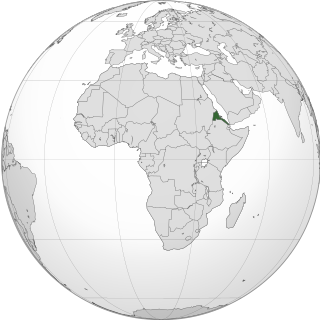Saudi Arabia ratified the 2000 UN TIP Protocol in July 2007.

Human rights in Eritrea are viewed, as of the 2020s, by non-governmental organisations (NGOs) such as Human Rights Watch as among the worst in the world, particularly with regards to freedom of the press. Eritrea is a one-party state in which national legislative elections have been repeatedly postponed, the judiciary is weak, and constitutional provisions protecting individual freedom have yet to be fully implemented. Some Western countries, particularly the United States, accuse the government of Eritrea of arbitrary arrest and detentions and of detaining an unknown number of people without charge for their political activism. Additionally, Eritrean citizens, both men and women, are forcibly conscripted into the military with an indefinite length of service and used as forced labour.

Lesbian, gay, bisexual, transgender, and queer (LGBTQ) people in Eritrea face severe challenges not experienced by non-LGBTQ residents. Homosexual acts are illegal in Eritrea; typically punishable by up to three years in prison. LGBTQ persons are reportedly prosecuted by the government and additionally face hostility amongst the broader population.
Sudan ratified the 2000 UN TIP Protocol in December 2014.
The United Arab Emirates ratified the 2000 UN TIP Protocol in January 2009.
Human trafficking in Israel includes the trafficking of men and women into the country for forced labor and sex slavery. The country has made serious efforts to reduce the problem in recent years and now ranks 90th out of 167 countries who provide data. Identification of victims, criminal justice work and efforts to co-ordinate with business and government agencies has been concerted in reducing this problem in the last decade.
Kazakhstan ratified the 2000 UN TIP Protocol in July 2008.
Lebanon ratified the 2000 UN TIP Protocol in October 2005.
Libya is a transit and destination country for men and women from sub-Saharan Africa and Asia trafficked for the purposes of forced labor and commercial sexual exploitation. While most foreigners in Libya are economic migrants, in some cases large smuggling debts of $500–$2,000 and illegal status leave them vulnerable to various forms of coercion, resulting in cases of forced prostitution and forced labor.
Bahrain ratified the 2000 UN TIP Protocol in June 2004.
Human trafficking is a major and complex societal issue in Myanmar, which is both a source and destination for human trafficking. Both major forms of human trafficking, namely forced labor and forced prostitution, are common in the country, affecting men, women, and children. Myanmar's systemic political and economic problems have made the Burmese people particularly vulnerable to trafficking. Men, women, and children who migrate abroad to Thailand, Malaysia, China, Bangladesh, India, and South Korea for work are often trafficked into conditions of forced or bonded labor or commercial sexual exploitation. Economic conditions within Myanmar have led to the increased legal and illegal migration of citizens regionally and internationally, often to destinations as far from Myanmar as the Middle East. The border regions of Myanmar, including Shwe Kokko, are known human trafficking destinations.
The Central African Republic (CAR) ratified the 2000 UN TIP Protocol in October 2006.
Chad ratified the 2000 UN TIP Protocol in August 2009.
The Democratic Republic of the Congo (DRC) ratified the 2000 UN TIP Protocol in October 2005.
Djibouti is a transit and, to a lesser extent, a source and destination country for men, women, and children who are subjected to trafficking in people, specifically conditions of forced labor and forced prostitution. There is little verifiable data on the human trafficking situation in Djibouti. An estimated 150 000 voluntary economic migrants from Ethiopia and Somalia passed illegally through Djibouti en route to Yemen and other locations in the Middle East in 2022; among this group, a small number of women and girls may fall victim to involuntary domestic servitude or forced commercial sexual exploitation after reaching Djibouti City or the Ethiopia-Djibouti trucking corridor. An unknown number of migrants – men, women, and children – are subjected to conditions of forced labor and forced prostitution after reaching Yemen and other destinations in the Middle East. Djibouti's large refugee population – consisting of Somalis, Ethiopians, and Eritreans – as well as foreign street children remain vulnerable to various forms of exploitation within the country, including human trafficking. Older street children reportedly act, at times, as pimps for younger children. A small number of girls from impoverished Djiboutian families may engage in prostitution with the encouragement of family members or other people in prostitution. Members of foreign militaries stationed in Djibouti contribute to the demand for women and girls in prostitution, including trafficking victims.
Egypt ratified the 2000 UN TIP Protocol in March 2004.
In 2009 Ethiopia was a source country for men, women, and children subjected to trafficking in persons, specifically conditions of forced labor and forced prostitution. Girls from Ethiopia's rural areas were forced into domestic servitude and, less frequently, commercial sexual exploitation, while boys were subjected to forced labor in traditional weaving, gold mining, agriculture, herding, and street vending. Small numbers of Ethiopian girls were forced into domestic servitude outside Ethiopia, primarily in Djibouti and Sudan, while Ethiopian boys were subjected to forced labor in Djibouti as shop assistants and errand boys.
Prostitution in South Sudan is legal but related activities such as soliciting or brothel-keeping are illegal.

Sound of Torture is a 2013 documentary film written and directed by Israeli filmmaker Keren Shayo which follows Eritrean radio host and human rights activist Meron Estefanos as she reports on Eritrean refugees who have been captured in Sudan while migrating across the Sinai Peninsula into Israel.

Ethiopian refugees in Sudan are individuals from Ethiopia who have sought asylum in Sudan due to various reasons, including the two-year civil war in the Tigray region and other challenging circumstances in Ethiopia.



